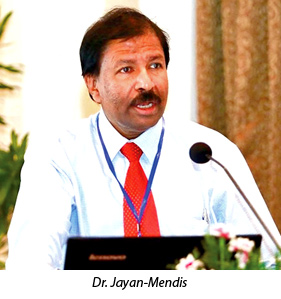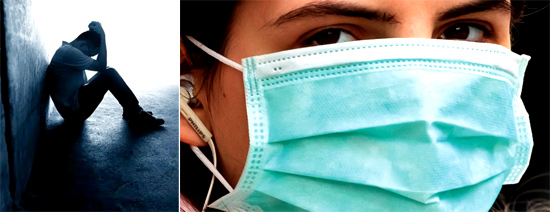
 The pandemic now ravaging the country with the added threat of the spread of the new Delta variant Omicron has raised anxiety and panic among the public in general elevating their stress levels and in turn leading to unnecessary mental and psychiatric problems.
The pandemic now ravaging the country with the added threat of the spread of the new Delta variant Omicron has raised anxiety and panic among the public in general elevating their stress levels and in turn leading to unnecessary mental and psychiatric problems.
The Sunday Observer spoke to Consultant Psychiatrist, Department of Psychiatry, Kotalawela Defence Academy University Hospital, former President of the Sri Lanka College of Psychiatrists and Founder Director of the National Institute of Mental Health ( NIMH), Dr Jayan Mendis to share his views on this new health issue that people across the country now face and learn from his experiences how it both affects them mentally and how they can overcome them by adhering to basic health rules.
Following are excerpts of the interview.
 Q. The theme of this year’s World Mental Health Day is ‘Mental health in an unequal world’. While the pandemic has affected everyone, people with long-term health conditions, or facing discrimination or parenting on their own are struggling the most and need more support. What is the relevance of this theme to the Sri Lankan scenario?
Q. The theme of this year’s World Mental Health Day is ‘Mental health in an unequal world’. While the pandemic has affected everyone, people with long-term health conditions, or facing discrimination or parenting on their own are struggling the most and need more support. What is the relevance of this theme to the Sri Lankan scenario?
A. The theme is relevant to the Sri Lankan public because I have personally witnessed varying psychological and psychiatric problems in patients who have faced the corona pandemic. Patients aside, even normal ordinary people have shown various fear reactions, unnecessary worries, obsessions, and various other kinds of psychiatric presentations during this pandemic.
Q. What about those who have been in quarantine in their own homes due to a close relative or neighbour who has been infected?
A. Those who are in quarantine don’t have much to do other than staying in one place or mainly concentrated in their house. As a result that can generate an excessive amount of stress and anxiety. This stress and anxiety can bring forward various other kinds of psychiatric presentations.
Q. Do you see a surge in the number of persons with mental problems in the past ten years? A study some years ago said that one in three persons have a mental problem in Sri Lanka. Do these figures still hold today?
A. Just as in most other countries even in Sri Lanka, we have observed a lot of patients with anxiety and anxiety-related or stress-related situations during the post-Covid 19 period.
Q. What kind of symptoms are we talking about?
A. Even though there are no properly conducted studies in Sri Lanka, most of these presentations are similar to those seen in other countries. In Sri Lanka, the situation is also similar, but I don’t have any statistics on this. However, as a result of Covid 19,it is usual for them to have pain, anxiety, and depression following Covid 19 illness.
Q. Age-wise and gender-wise who are more vulnerable to psychiatric problems due to the Covid 19 pandemic?
A. Patients who are more vulnerable to Covid 19 are those who are above 60 and those who suffer from diabetes, high blood pressure and various other kinds of medical problems. Similarly, those who have been undergoing various other kinds of psychiatric problems and psychological disturbances are also more vulnerable.

Q. Is smoking a contributory factor?
A. Yes, of course. Chain smokers and those who smoke heavily can develop severe complications as a result of smoke and their lung tissues can get damaged as a complication of Covid-19. Most of the patients can develop various kinds of lung tissue destruction. As a result of these lung tissue destructions, they get various respiratory difficulties. Especially in chain smokers or those who smoke excessively, their lung tissues are usually fragile and usually undergo various kinds of damage. As a result, they are more susceptible to complications of Covid-19.
Q. Are mentally disturbed patients more vulnerable to the Coronavirus now spreading in the country? For how long will the virus remain in our bodies?
A. The virus can usually be infectious only for the first 14 days. Thereafter, even though the virus is seen in the body, it is going to be in an inactive form. As a result of this inactive form, they will not be going to have any disturbance to others or the virus is not in a state to produce illness after 14 days.
Q. What does it mean to be an asymptomatic patient? What are the signs to look out for?
A. Asymptomatic patient means the patient will have the virus on their body, but they will not present with any kind of difficulties or any kind of symptoms. Pre-symptomatic stage of Covid-19 is they don’t get infected with the virus, but before infecting with the virus they may have various kinds of psychiatric problems or anxiety.
Q. A question that is worrying both normal people and patients is for how long the virus remains on surfaces that have been contaminated. Your comments?
A. Covid-19 virus stability on the surface depends on the surface material. According to recent studies, the virus remained on hard surfaces such as plastic, stainless steel for 6 days, on banknotes it lasted for 3 days, on surgical masks for at least 7 days, on clothes for less than 8 hours.
Q. Evidence is showing that even normal persons without psychiatric problems who have been forced to spend several days in home quarantine because a family member or neighbour has developed Covid positive have shown signs of anxiety, panic, obesity. What has triggered these symptoms?
A. Yes, home quarantine and a family member of someone in the neighborhood found to be Covid- 19 positive will naturally result in various kinds of mental stress in those affected. At the same time, due to this enforced isolation and deprivation as I explained to you earlier, they may have undergone various difficulties such as psychological difficulties and even paranoid disorders. It is also possible that they could resort to alcohol abuse and drug abuse. Suicidal behaviour is also not uncommon among those with stress-related problems.
Q. Are patients with pre-existing conditions more vulnerable to Covid 19? What are the likely complications they will develop if they get Covid 19?

A. We can see a higher risk of Covid-19 infection among those with pre-existing cardiovascular diseases (CVD) and it has been connected with various kinds of complications such as myocarditis, acute myocardial injury, venous thromboembolism, and arrhythmias. These cardiovascular diseases increase morbidity and mortality among Covid-19 patients. Covid-19 can directly affect the heart and this leads to show cardiac muscle inflammation in Covid-19 infected patients including patients who didn’t have cardiac problems previously. As a result, cardiac muscle damage, variations in heart rhythm, and disturbs the optimal blood pumping may occur.
Q. So what are the Do’s and Don’ts you recommend to every one of us who is exposed to the virus now ravaging our country and the rest of the world?
A. I would say follow the health regulations to the letter. If you haven’t got immunized do so immediately. If you are eligible for a booster get it for protection.
Do’s
Wash your hands before cooking or eating, after using the bathroom, after blowing your nose, coughing, or sneezing.
Clean the surfaces regularly using disinfectant
Make sure to clean frequently-touched surfaces properly expose to the sunlight frequently-touched surfaces Cover your mouth and nose with your elbow or tissue when coughing or sneezing. Dispose of used tissue immediately.
Take warm food and drink
Don’t’s
Don’t touch your face (eyes, nose, and mouth)
Don’t cough or sneeze into your hands.
Don’t share personal items including eating utensils
Avoid cold food from outside
Q. Your message to the public?
My message is those who adhere to Covid-19 guidelines will not catch the disease. Main health guidelines are using a mask properly, washing their hands properly, not having much social interaction, and not mixing with crowds unnecessarily. If they follow these health guidelines, they will also be able to rid themselves of unnecessary fears, apprehension, and anxiety which can lead to stress and psychological problems.
